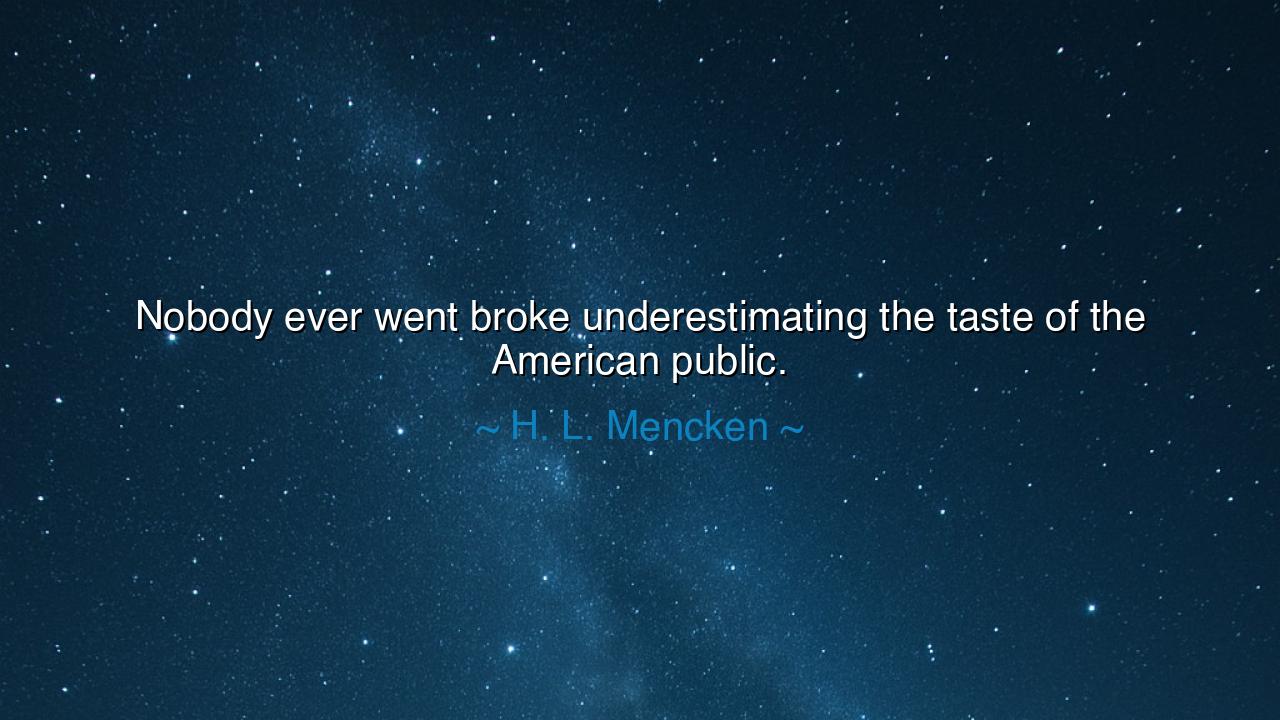
Nobody ever went broke underestimating the taste of the American






"Nobody ever went broke underestimating the taste of the American public." – H. L. Mencken
In the great flow of history, the pursuit of wealth and success has often been tied to the ability to understand, manipulate, and sometimes even deceive the masses. H. L. Mencken, in his biting critique, reminds us that the power of the public’s taste, particularly in America, is not necessarily rooted in depth or sophistication. Rather, it is often driven by superficiality and a desire for the easily consumable. Mencken’s words cut to the heart of the human condition: that while greatness and innovation may be revered by the few, it is the quick gratification and instant appeal that often capture the attention and favor of the many. To underestimate the public’s taste is to ignore the simple and immediate desires that govern mass consumption, desires that are far removed from the ideals of truth, beauty, or depth.
In the ancient world, the masses were often swayed not by reason or philosophy but by the allure of spectacle and entertainment. The Romans, for example, understood this all too well. The gladiatorial games in the Colosseum were a reflection of the public’s hunger for spectacle, for blood and thrills, not for philosophical discourse or poetic reflection. The emperors of Rome knew that to hold the favor of the people, one needed to provide distractions and diversions, the things that would keep them entertained and distracted from the realities of their lives. Mencken’s observation echoes this understanding: the masses, whether in ancient Rome or modern America, are often not swayed by the complexity of things but by their immediate appeal.
Take, for instance, the story of Caligula, the infamous Roman emperor, who, in his desperate desire to hold the people’s favor, transformed the arena into a space of grotesque entertainment. He fed the public with an endless supply of bloodshed, reveling in the spectacle that would keep the people distracted from the true complexities of governance and the suffering of the masses. The people, intoxicated by the show, forgot about the crumbling empire around them. In this way, Caligula exemplified Mencken's warning: entertainment, when it is cheap and visceral, will often win the hearts of the people, even if it leads to moral decay and corruption.
In the modern world, this phenomenon plays out in the entertainment industry and the media. The popularity of reality television, celebrity gossip, and viral internet trends reflects this same principle: the immediate, the easily consumable, and the sensational are far more appealing to the masses than complex ideas or thoughtful reflection. Consider the rise of the reality TV show in the 21st century, a genre built on the concept of drama, conflict, and shallow spectacle. These shows, while providing fleeting moments of entertainment, rarely challenge the viewer to think critically or engage deeply with the human condition. Instead, they feed the public’s insatiable desire for simple distractions, reinforcing Mencken’s assertion that quick gratification often trumps more thoughtful pursuits.
The lesson of Mencken’s quote is not one of condemnation but of recognition—a recognition of the human tendency to be drawn toward the easy, the immediate, and the sensational. It is a reminder that while depth and wisdom may be the domain of a select few, the masses often crave the surface-level appeal of instant gratification. Mencken warns that, in understanding this dynamic, one can either choose to manipulate the public for personal gain or use that knowledge to provide something of greater value. It is a challenge to those who wish to lead, create, or influence: to acknowledge the shortcomings of mass taste without falling prey to them, and to offer something that transcends the cheap allure of spectacle.
In our own lives, let us heed the wisdom of Mencken’s words: to understand that superficiality and instant gratification often dominate our collective desires, but that this does not mean we must succumb to them. Instead, let us seek to raise the level of public discourse, to provide experiences, ideas, and art that challenge and elevate the mind, even if they are not immediately popular or easy to consume. While the masses may always seek the quick and shallow, we, as individuals, have the power to guide them toward deeper truths and more meaningful pursuits, to create and nurture a culture that values substance over spectacle. The ultimate challenge is not to deny the power of the crowd, but to craft a world where true wisdom, beauty, and depth can thrive alongside the ephemeral temptations of modern entertainment.






AAdministratorAdministrator
Welcome, honored guests. Please leave a comment, we will respond soon